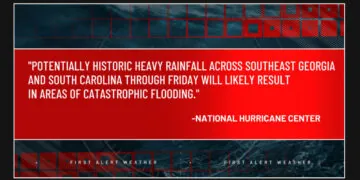Last week, the world experienced its four hottest days on record, while meteorologists in South Carolina cautioned that this trend of extreme weather events could persist due to climate change.
Rob Fowler, a seasoned meteorologist at WCBD in Charleston, believes that every event cannot be attributed to global warming since weather follows a cyclical pattern. However, he acknowledges that the earth is undeniably warming up, leading to an increase in the frequency of extreme weather incidents.
According to him, the impact of heat can be compared to a pot of water that is being heated on the stove.
Fowler explained that as soon as the stove is turned on, the atmosphere begins to bubble and boil. This means that the state can expect to experience more extreme weather conditions such as hurricanes, tornadoes, storms, and flooding.
Climate experts suggest that responding to climate change can be approached in two primary ways: mitigation and adaptation. Mitigation aims to reduce greenhouse gases in the atmosphere to lower future temperatures, while adaptation focuses on preparing communities to face the challenges of extreme weather and rising sea levels.
So far, South Carolina has focused its efforts on adapting to the challenges posed by climate change. While the state has made some strides in mitigation, the majority of progress has been in the realm of adaptation.
A ‘mixed bag’ on emissions
Climate activists and policy makers have identified two significant missed opportunities and two fortunate accidents in South Carolina’s mitigation efforts.
In 2007, the chance to tackle climate change was missed when the then-Governor of South Carolina, Mark Sanford, established a state climate commission aimed at decreasing greenhouse gas emissions.
In an interview with The State newspaper, Sanford acknowledged the reality of climate change and expressed a desire to use it as a chance to take a leadership position.
Dana Beach, founder of the Coastal Conservation League and a member of the commission, stated that the initiative had a promising start, but unfortunately, it lost momentum and did not continue as planned.
According to Beach, the group had been meeting for a year and had developed some well-thought-out strategies. However, at the final hour, Sanford deemed them too controversial, and as a result, their efforts came to naught.
In 2017, the V.C. Summer nuclear project suffered a massive collapse, resulting in prison sentences for top utility executives, including then-CEO Kevin Marsh, and costing ratepayers a staggering $9 billion. If completed, the project could have added 2,200 megawatts of energy to the S.C. grid, without any greenhouse gas emissions. This would have been enough to power approximately one million homes, which is crucial in a state experiencing rapid growth.
Beach commented on the ongoing environmental debates surrounding nuclear power generation, stating that the current crisis with climate and carbon requires difficult choices. He expressed disappointment over the failed project, stating that it would have been a significant advancement. Beach attributed the failure to SCANA’s incompetent, secretive, and deceitful top management.
Environmentalists acknowledge that South Carolina has inadvertently made some positive strides in the area of mitigation.
The state currently relies heavily on its nuclear infrastructure which was originally built without considering climate change. Surprisingly, this infrastructure is incredibly strong, accounting for over 50% of the state’s power generation, making it the third highest in the country.
South Carolina has become a prominent figure in land conservation, with over 3 million acres, or more than 15% of the state’s total land, under protection. This development has been a significant step forward in mitigating environmental concerns. Moreover, Governor Henry McMaster has pledged to double that number to 6 million acres by 2050, further emphasizing the state’s commitment to conservation efforts.
Beach emphasized that forest conservation and restoration is the most critical strategy for mitigating the effects of climate change in the state. He stated that the state is actively involved in sequestering thousands of tons of carbon every day through the growth of forests. This underlines the significance of preserving and restoring forests in the fight against climate change.
A ‘regional leader’
South Carolina has emerged as a regional leader in climate adaptation, despite facing challenges in mitigating the effects of climate change. This effort gained momentum after Hurricane Florence wreaked havoc in the state in 2018, causing extensive damage worth over $2 billion.
In 2020, the S.C. Office of Resilience was established through dedicated efforts to pinpoint the significant climate vulnerabilities and assets in the state. The primary objective of the newly formed office was to initiate a statewide resilience and risk reduction plan, which became its first major undertaking. The plan was completed and released in 2023, following extensive data collection.
According to a statement by SCOR spokesperson Hope Warren, the Resilience Plan serves as a framework to direct state investment towards flood mitigation projects and the implementation of programs and policies aimed at safeguarding the people and property of South Carolina from the devastating impacts of extreme weather events.
Within the report, there are a grand total of 54 recommendations that are specifically tailored towards climate adaptation programs, policies, and projects.
Alys Campaigne, the climate initiative leader for the Southern Environmental Law Center, expressed her admiration for the plan, citing its ability to provide explicit recommendations for funding programs, establishing policies, and enhancing the state and communities’ preparedness and adaptability. She emphasized that having a framework is crucial to achieving the necessary coordination between agencies and communities to respond and adapt effectively.
According to environmentalists, the effects of the plan can already be seen throughout the state. Homeowners are now required to disclose any previous flooding incidents to potential buyers, and local government initiatives like Columbia’s municipal solar and smart surfaces projects are being implemented. The resilience office has also gathered data that has led to the allocation of federal funds for important state adaptation projects.
Climate activists are highlighting the $3 million South Carolina received in 2023 to kickstart the development of a climate pollution reduction plan, projected to be completed in 2027. Additionally, they are drawing attention to the newly-announced $421 million grant from the Environmental Protection Agency that South Carolina will share with Virginia and North Carolina. The grant is aimed at restoring coastal land, enhancing water quality, and mitigating environmental risks.
Climate experts emphasize that simply focusing on adaptation efforts is not enough to tackle the issue of climate change. Without substantial action to reduce greenhouse gas emissions, these efforts will ultimately prove insufficient.
Campaigne emphasized the urgency to prioritize the development of clean energy and transportation options to mitigate risks and ensure safety. “We must do more to deliver these solutions,” he stated.
In January, a new energy bill will be on the agenda for the S.C. General Assembly. Climate activists are committed to preventing the quick approval of a large natural gas plant in rural Colleton County, and advocating for a more equitable energy policy that recognizes all energy sources, including renewables, on an equal footing.











